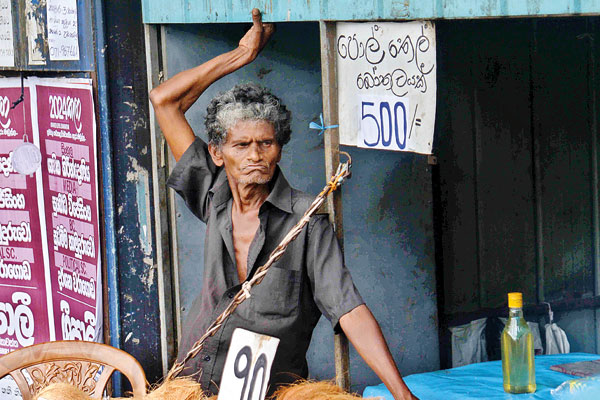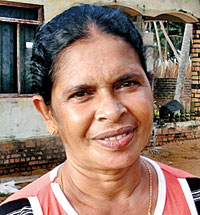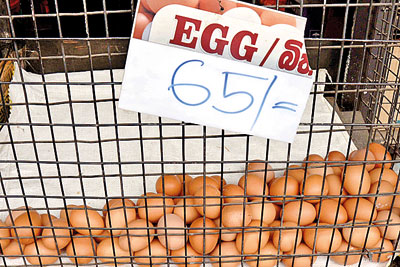News
Eye-watering zeros in festive grocery bill
View(s):
Shoppers are cutting back on clothing to save for Christmas food
By Nadia Fazlulhaq andHiran Priyankara
For many Sri Lankan households, the ever-increasing prices of food items has made Christmas and a New Year an unprecedented challenge, despite the relative celebratory mood in the post-pandemic period.
An egg cost about Rs 25 last year, but now, even at Rs 50 to Rs 55 each, there is a severe shortage. This means, making cakes, eggnog, and eggs for the Christmas lunch or dinner is a tough choice to make. Due to the shortage of eggs at retailers, many people buy at supermarkets where a carton of 10 is priced at Rs. 620 to Rs 750.
Chicken is priced between Rs. 1,300 and Rs 1,590 per kilo, compared with Rs. 690 last year. The price of pork has shot up from Rs. 1,000 per kilo last year to more than Rs. 2,000, while premium cuts are priced at Rs. 3,000 and Rs 3,400. Beef and mutton prices, too, have increased by nearly 50% from last year.

Many are forced to forego festive food preparations due to the high price of commodities. Pix by Eshan Fernando and Hiran Priyankara
Canned fish and fresh fish are costlier. Tinned fish now costs Rs. 650 and Rs 850 compared with Rs. 350 last year.
The price of wheat flour has increased by 100%, and sugar sells for Rs. 236 (white) and Rs.384 (brown). Last year, sugar was Rs.150 per kilo.
The prices of all varieties of rice have soared. Twelve months ago, raw rice, samba, nadu, and ponni were sold for between Rs.110 and Rs 160 per kilo. Now, these sell for Rs. 210 and Rs 260 per kg.
A 3 kilo sack of Basmati sells Rs. 4,000. Mysore dhal which was Rs. 270 per kilo last year, now costs between Rs. 370 and Rs 520. Spices are even more costlier. Prices of dried chilli, pepper, mustard, fennel, cumin seed, and cinnamon have risen significantly. A kilo of dried chilli which sold for Rs. 716 last year is now Rs. 1,815. A kilo of pepper which was Rs. 1,468 last year, now costs between Rs. 2500 and Rs 3200.
The prices of margarine, butter and ice cream, too, have risen.

Dhammi Perera from Puttalam
“There is a huge shortage of eggs due to low production and bigger demand. Hotels are directly purchasing from farmers, so there is a shortage in the retail market,” said Ajith Gunasekare, president of the All Island Poultry Farmers Association.
Prasanthi Silva from Wattala said their family had to hold back on shopping for clothing to save for Christmas food. She said dessert preparations had to be cut down due to the high prices of eggs, sugar, milk, and butter.
G. Rajendran of the Essential Food Commodities Importers and Traders Association, said prices of spices will rise further in the New Year.
“Covid-19 had an impact on the Indian spice harvest, so prices have gone up there. The fertiliser issue has an impact on the local production and the increasing labour cost, packaging, and electricity cost, will affect future prices,” he cautioned.
While decorations and celebrations are seen in some big cities, in rural areas, and among the fisher folk, the rising prices of food and kerosene are hitting them hard.
“Our Christmas meal is no different from a daily meal. We struggle to earn enough to buy kerosene for our fishing boats that we have barely anything left for a special meal,” said fisherman Noel Ranjith. He laments his inability to buy toys for his children.
Dhammi Perera from Puttalam, said she managed to buy only a limited amount of dry rations. “There will be no celebration this time. Most fishermen are struggling with no income at all. The fuel crisis was a huge hit to us,” she sighed.
A daily wage earner, A.W. Perera said the family will not buy new clothes for New Year.

The best way to say that you found the home of your dreams is by finding it on Hitad.lk. We have listings for apartments for sale or rent in Sri Lanka, no matter what locale you're looking for! Whether you live in Colombo, Galle, Kandy, Matara, Jaffna and more - we've got them all!

